Hallelujah! Freedom is Come!
a tired old man's walk, at the end of the world
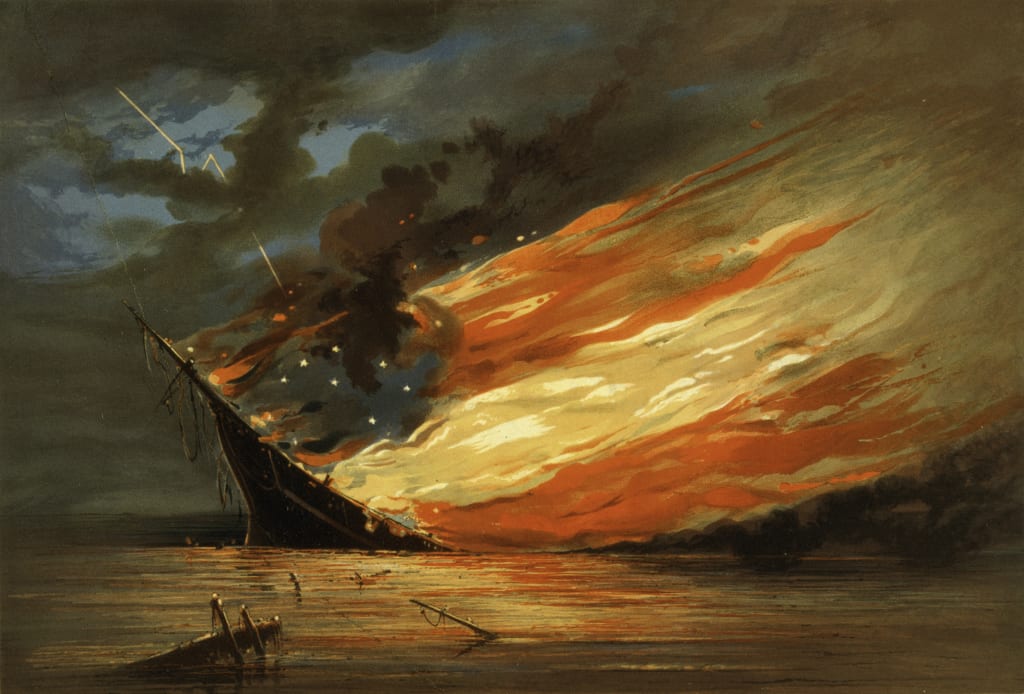
It went like this;
The ivory towers grew steps, and the lords came down, drugs in their hands and smiles on their faces. They fed us, and they clothed us, and we laughed and loved.
We slept in pressed sheets that bore the names of pharmaceuticals, and ate from clean, white plates that were decorated with the iconography of starvation. We paid for children to be slaughtered, that we may have our entertainment. We cut each other’s throats and eagerly lapped at the blood that coated our shirts.
Outside, the wind blew hard and snow fell fierce. Murderers reddened their hands with our money. Boys ran through scrapyards, picking out soot-smeared guns and turning them on each other. One by one they glanced up to the sky, where an angel blanketed them in holy hellfire.
The sirens blared that we were on the righteous path, and when accusing fingers pointed at us, we screamed that same message.
“Hallelujah! Freedom is come!”
The cars stopped moving on their roads, highways cluttered with a sea of scrap metal. The shopping malls, they closed one by one, and food rotted on their shelves. Grinning mascots glared down with glistening teeth. The gravel beneath our feet cracked and came apart, and the buildings upon it began to tumble down.
People took to the streets, they waved their flags and they shouted their pieces, then went home and sucked for the power in their walls.
An inferno rose from within. It scorched the forests and purged the grasslands, tore through the skies and ravaged the horizon. Animals cowered in their burrows, until they suffocated in the rising smoke. Oil blanketed the oceans, and the blaze cut across that blue expanse as well, a country’s worth of filth and unwanted happiness. Heat rose from every recess, and the rains brought no deliverance. We stood, in awe of the devouring monster, and we paid our fealty, hoping that it would delay the date of our incineration.
Near the end, I touched her pale arm, and my fingers burned with the guilt. A splinter of metal sat on her throat, like two bullets welded together, matching the fibers in her lungs. She took it from around her neck, and said something I can’t remember, something like; “No more.” and then she was gone, while the radio blared comforting emptiness.
I took a walk, at the end of the world. Out past the old insulation mill, along the main road, by the chemical plant, and down to the wharf. I used to love that place. The great big ferris wheel, the ice cream on the pier, carnival games and shows in the summer.
It would be a long way to travel now, for my weak knees and faint heart.
I remember leaving the house, irritated at the darkening sky, marching down the weathered porch and out into the cracked streets. I brought everything I usually did; wallet, phone, and that little splinter, as though it could have been any other day. A plastic bag drifted across the sidewalk, then stopped, caught in the teeth of a storm drain, and I carried on.
The mill was a small, one-story building, where the women would weave insulation for four dollars an hour. I would visit her there, on my days off, and we'd walk down to the shoreline to watch the ships go by.
Now, the paint was peeling, and coming away in patches. Underneath I could see little slivers of brickwork, where tufts of choking weeds were worming their way through the concrete. Shattered windows pointed jagged glass like rows of teeth, and out front sat a truck with no wheels, rusting into the dirt. I gripped the gate with my fingers, watching the dilapidated structure past a sign that read; ‘FORECLOSED.’
“How do you do, sir?” asked a voice to my left, and I slowly turned my old bones to face a pretty young lady, dressed in a clean white blouse. Her hand gripped a clipboard, resting at her hip.
“Can I help you?” she asked, smiling wide.
“Are you one of the mill people?” I grunted, annoyed at having been disturbed.
She shook her head. “No sir, I do not represent the mill in front of which we stand. I am an ambassador and actuary of the Saxton-James insurance company, a subsidiary firm of the geographically relevant financial establishment engaged in the production of interior airflow propagation.”
I grunted again, and turned back to the mill.
“Have you considered purchasing insurance from the Saxton-James firm? We offer very agreeable rates, for you, your wife, and your children.”
I balled up some of the phlegm that rose in my throat, and spat it to the ground.
“My wife is dead.” I told her.
“Oh, my condolences, sir. However, might I recommend securing the future for yourself, so as to commemorate your dearly departed’s memory with the promise of self-care and caution?”
I opened my mouth to speak, then stopped, and looked down at the cracked concrete beneath my feet.
I told the woman; “No thank you.” and I left her at the gate.
Turning right past the mill, I wandered down the first few blocks of the main road. Already I could feel a stitch growing in my side, but pain was just a fact I had learned to live with in old age, along with so many other things.
Pairs of people walked past me, chatting and smiling. Here and there the odd one walked alone, their eyes on the pavement.
The streets seemed so much emptier, and the buildings so much more cold than I ever remembered; big grey shapes that blotted out the sun, growing taller as I walked. Overhead, a train rattled along its tracks with a screech. I paused for a moment to catch my breath, and a pair of kids ran up to me, with bright red icy-poles in their hands.
“Hey, old man.”
I glanced down at the one that had spoken, a little guy, maybe twelve years old.
“D’you got any change for the bus?”
I chuckled, which hurt my chest, but I was already reaching for my wallet. “Sure, kid. How much do ya need?”
He looked over at his friend, who gave him a grin. “Uh, ten bucks I guess.”
I pulled a ten dollar note out, and handed it to him.
“Hey. Thanks old man!”
“No worries.” I told him. “Maybe save some of it, for when you’re grown up.”
The boy tilted his head, like my words didn’t make any sense to him.
“No need, old man. I’m gonna be in the army when I grow up, and I'm gonna be so good at killing bad guys, I’ll never worry about money again.”
A honking sounded from down the road, and hot exhaust gas jetted out onto the sidewalk.
“Hey, we gotta go. Thanks again.” and then off they ran, towards the bus which proudly bore ‘Fares not exceeding $2.75’ upon its windshield.
I looked down, and a crushed ant lay where they had stood.
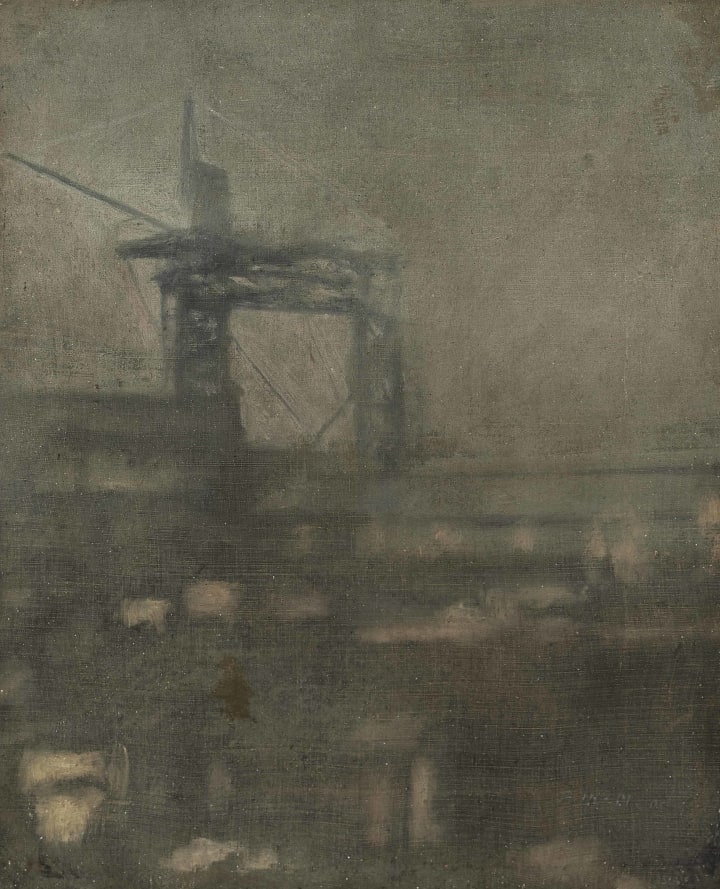
I left the main road behind, and the buildings shrunk behind me as I passed onto that little gully track. The old bridge that crossed the creek and led down to the wharf had been there since I was a child, and I must have used it thousands of times. Little creatures would run along that stretch, and I remembered watching a hare once, nose sniffing the ground, whiskers twitching, until it finally scurried off into the trees as I crossed. Afterwards, I had only wished that I’d brought someone to come see.
That day, there were no creatures, or even trees upon the path. That day, I watched black smoke rise from the concrete chemical factory that sat off to the side, its outer walls streaked with yellow grime.
I stepped up onto the dirt and saw my shoes move over little grains of sand, mixing with black sediment. Looking up, the rickety wooden bridge stood before me, either side bordered with barbed wire. The rotting carcass of some small animal lay tangled within, but nothing had come to pick its bones clean. Where undergrowth once lay on the banks, instead sat pipelines, soil turning sandy and soft underneath. Down the way, a runoff valve spewed filth into the creek below, and I could almost feel the impact of solid slop hitting the water.
The bridge itself was coming apart; supports very nearly rotted through, railing awash in splinters. What scrub had managed to survive on the creek bank clung to it desperately, seeding between knots in the dying wood.
I peered over the side, at the sluggish, black waters below, and I wondered where my hare was.
The last stretch to the wharf was probably the toughest, over knolls of dying grass and sand. Here and there, pieces of pavement jutted up through the scrub, and I was forced to keep re-adjusting my steps so that I wouldn’t slip. By the time I finally reached the gates, I was completely out of breath. Leaning against an old pole, with my lungs heaving, I stared out the pale grey ocean that stretched before me.
Up on the boardwalk, the rust-riven ferris wheel rocked gently in the wind, and the side stalls sat with fronts boarded shut. Past the gate, four riderless merry-go-round horses lay discarded by a hastily-made plastic sign, reading; ‘Under Renovation’
With my strength recovered, I stepped past the horses, past the sign, and up onto the wood of the boardwalk. By my feet, spilled soda turned the boards sticky, and empty drink cups rolled through the puddles, gathering grime as they went. A plastic bag that had been snared on a bench suddenly caught free and drifted out into the ocean.
I kept walking, right along to the railing at the end, the one that I used to dare my friends to jump off. I reached into my pocket, and pulled out her splinter of metal. The chain hung between my fingers, lifeless and limp.
“Watcha' got there mister?” came an unseen voice, and I glanced over to a homeless man, sitting among the garbage bins at the edge of the pier. I didn’t reply, so he stood up and walked over to me. “Some kinda heart thing?”
“Look, I’m sorry, but I just want some peace.” I told him, and he nodded empathetically, before stepping back a bit.
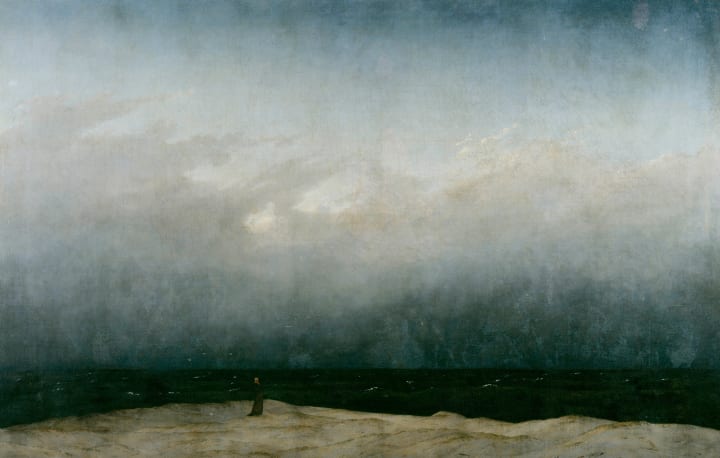
We stood together for a time, watching the ocean roll in and out under thunderclouds. The sound of the surf, the distant screech of seagulls, and the beating of the heart in my chest. Out among the waves leered the scraps of sunken ships and discarded fairground apparatus. Somewhere off in the distance, there was a rumbling of thunder.
“End times are coming." I told him, grimly. “The world is an ugly, disgusting place and I don’t want to live in it.”
The homeless man laughed a deep throaty laugh. “Man, that’s sure brave of you to say. Folk'll call you crazy for that kinda talk.”
I regarded him carefully. “Do you think I’m crazy?”
He shrugged. “Can’t be crazy if the world’s crazy. That makes it crazy to be sane.”
I smiled, and looked down at the splinter of metal in my hand.
"Why are you out here?” I finally asked.
“Why am I out here? Because this is the best place on earth! I got the big wheel, I got the merry-go-round, I got the sideshow games, all to myself! I used to love it here man, hell, I still do.”
I nodded along, raising my eyes. “Me too, man. Me too.”
I pulled back my arm, and threw that splinter high and far across the ocean waves. There was glint of sunlight against the flotsam, and then it was gone.
I turned around, and began my walk home.
About the Creator
boshmi
I write short stories every few weeks or so, mostly inspired by early modernist literature. These are the ones I like the best.
Enjoyed the story? Support the Creator.
Subscribe for free to receive all their stories in your feed. You could also pledge your support or give them a one-off tip, letting them know you appreciate their work.


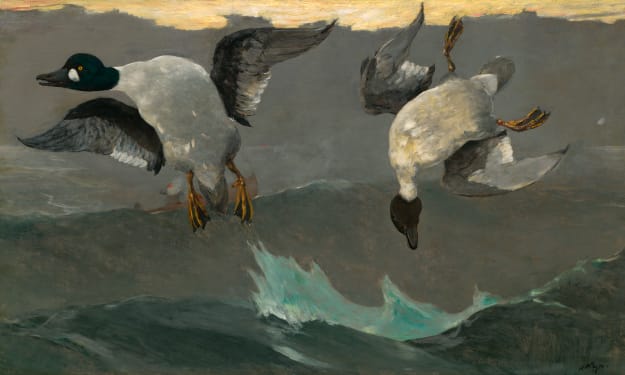
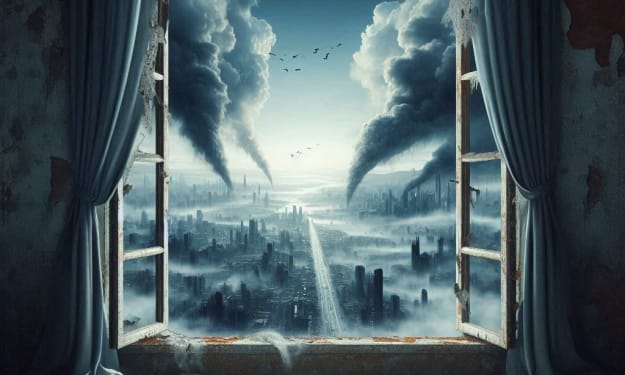


Comments (1)
A thoroughly enjoyable description of an apocalypse for our times. Great writing Boshmi- looking forward to hearing more..